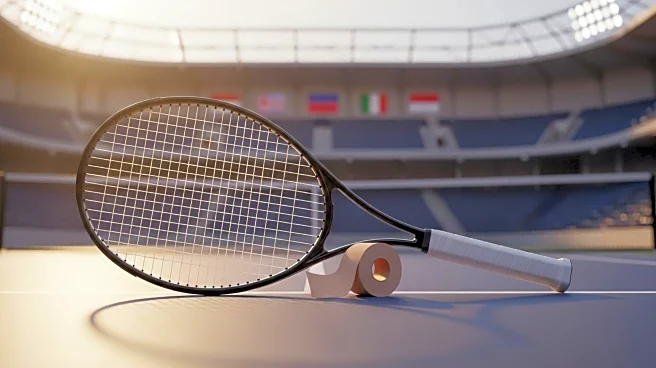What's Happening?
Carlos Alcaraz, the world No. 1 tennis player, successfully advanced to the quarterfinals of the Japan Open despite concerns over an ankle injury sustained during his opening match. Alcaraz landed awkwardly on his left ankle, raising fears about his ability to continue in the tournament. However, he managed to secure a 6-4, 6-3 victory over Zizou Bergs, setting up a quarterfinal match against American player Brandon Nakashima. Alcaraz attributed his recovery to his physiotherapist, whom he praised as the best in the world, expressing confidence in the treatment received. This season, Alcaraz has already claimed seven titles, including victories at the French and US Opens.
Why It's Important?
Alcaraz's ability to overcome an injury and continue competing at a high level highlights the critical role of sports medicine and physiotherapy in professional athletics. His success underscores the importance of having a skilled medical team to support athletes in maintaining their performance and managing injuries. This development is significant for the tennis community, as it demonstrates the resilience and determination required to compete at the top level. Additionally, Alcaraz's continued participation in the Japan Open adds excitement to the tournament, drawing attention from fans and media alike.
What's Next?
Alcaraz is set to face Brandon Nakashima in the quarterfinals, where he will aim to continue his impressive run this season. The match will test Alcaraz's recovery and ability to perform under pressure, given his recent injury scare. Fans and analysts will be closely watching to see if Alcaraz can maintain his form and advance further in the tournament. The outcome of this match could influence Alcaraz's standing in upcoming competitions and his preparation for future events.
Beyond the Headlines
The incident with Alcaraz's ankle injury brings attention to the broader issue of athlete health and injury prevention. It raises questions about the physical demands placed on professional athletes and the measures taken to ensure their well-being. The reliance on physiotherapy and medical expertise highlights the evolving nature of sports science and its impact on athlete longevity and performance. This case may prompt discussions on improving support systems for athletes to prevent injuries and enhance recovery processes.










